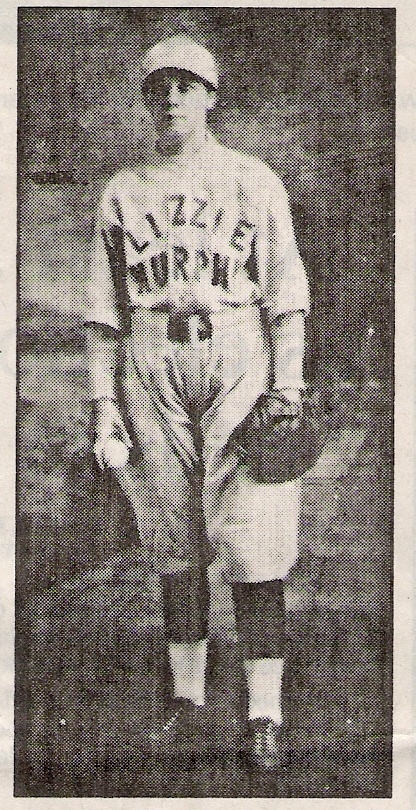1965 Sports Illustrated article on Warren Hall of Famer Lizzie Murphy
June 21, 1965
Compliments of Sports Illustrated Articles ( Author John Hanlon)
One of summer’s sporting wonders in New England and eastern Canada in the 1920s and early 1930s was the appearance and performance of Lizzie Murphy as first baseman on men’s baseball teams barnstorming the region.
Early in her life and profession Lizzie put aside her Christian name of Elizabeth and was billed variously as “Spike” Murphy, “the best woman baseball player in the country,” “The Queen of Baseball,” or, simply and as she preferred it, just “Lizzie.” That was the name she had emblazoned in large letters on the blouse of her singular touring uniform. The name of the team, whatever it happened to be, was of less interest to the public than her own. When at business, Lizzie wore her reddish-blonde hair wound tightly around her head and tucked up under her peaked cap. She was a tallish, tomboyish 5 feet 6 inches tall, and her playing weight was 120 pounds. In the field she chattered constantly in the fashion of ballplayers who possessed the old vinegar.
Only her fame and the name on her blouse, rather than a mincing, feminine approach to the game’s demands, set Lizzie apart from her teammates. Lizzie could field, throw and run with any man among them. Her only shortcoming was a perhaps understandable lack of power with the bat.
At first, when Lizzie started barnstorming New England with Eddie Carr’s All-Stars of Boston in the early ’20s, the ever present wowsers protested Manager Carr’s exploiting a woman in such fashion. Carr did not check his swing in replying.
“She swells attendance, and she’s worth every cent I pay her,” Carr said. “But most important, she produces the goods and, all in all, she’s a real player and a good fellow.” “No ball is too hard for her to scoop out of the dirt, and when it comes to batting, she packs a mean wagon tongue.”
Back where Lizzie came from—Warren, R.I. a small town on the eastern shore of Narragansett Bay—there was no quarrel with these ultimates of Carr’s, except he didn’t go far enough. Warren felt that Lizzie was all of them and more—a veritable female Frank Merriwell.
Her older and only brother, Henry, to this day claims that no boy Lizzie’s age on the east shore could keep up with her on ice skates. She also was an excellent swimmer. Her background was French on her mother’s side, and she spoke the language fluently—if Canadian-style. (Once in a game in Canada. Lizzie overheard the opposition’s first-base coach unsuspectingly giving the steal signal in French. Lizzie called time, set up a code with her catcher and flashed it each time a runner was to be sent down. “Nailed five of them that way,” she said proudly.)
Lizzie also won local renown as a long-distance runner, dabbled in soccer and was proficient on the violin. But her preoccupation, hobby and passion remained baseball. Brother Henry started her at it, playing catch. Her mother fretted about it and her father, a mill-worker and baseball player himself, encouraged Lizzie, thinking it a tomboy’s interest that would pass. He underestimated his Lizzie. “When I was at an age when kids threw stones at cats and hens,” Lizzie said, recalling once her indoctrination into the sport, “I guess I hit the mark as often as any of the boys. When I got a little older, I would join the boys playing one o’ cat.” Around the age of 12 she was put to work in one of Warren’s then flourishing woolen mills. |
“But I was always dreaming of the outdoors and baseball,” Lizzie said of her time before the looms. “Even then, when I was too small to play, I used to beg the boys to let me carry the bats. Finally, I was allowed to join the team for only one reason: I used to ‘steal’ my father’s gloves and bats and bring them along, so I was a valuable asset to them when I could furnish some of the equipment.” Almost from the start Lizzie’s performance in the scrub games was so good that she soon was the premiere choice of the team captain with first picks. By the age of 15, she was playing with such amateur clubs as the Warren Silk Hats and the Warren Baseball Club and was on her way. There was one hesitancy along about the age of 18. Lizzie came to the familiar crossroad reached by most athletically able young ladies: the time when they must decide whether to continue at games or become proper girls. “I about decided that baseball wasn’t a game for a girl and that I’d quit,” Lizzie said, shortly after facing that critical junction. “But then I went to look at one of the games. It just made me crazy to take a turn at the bat and line one out.” The verdict was for baseball, and thereafter her career went along full tilt, starting on a paid professional basis on a Warren semipro team. Starting, that is, after a significant one-game delay. In Lizzie’s first appearance with that particular team the customary hat was passed among the spectators, and the rather large sum of $85 was returned. Not without cause, Lizzie felt her presence had contributed to both the attendance and the contributions. However, so the tale goes, when it came time to divvy the pot, Lizzie was somehow “overlooked” and received nothing. The team manager, though, was sufficiently aware of Lizzie’s impact to remember to book the team into Newport, just down the road, for the following Saturday. With Lizzie as an attraction and all those sailors handy, he figured on a bonanza. All week long before the Newport engagement Lizzie came to practice, taking her workout with the team, saying nothing about finances. On Saturday morning, with interest running high at Newport, Lizzie became, without much doubt, baseball’s first woman holdout. She simply told the manager as the club gathered for the trip, “No money, no Newport.” The manager quickly capitulated for a sum of $5 per game, plus an equal share of the collection. Lizzie moved into relatively bigger money when she joined a team called the Providence Independents about 1918 and began touring southern New England. She made still more money when the All-Stars of Boston took her on a few years later. With the latter club Lizzie made her forays into Canada, playing as many as 100 games a season. She never did reveal how much money she made, but a portion of her take came from her practice of going into the stands and hawking a picture postcard of herself in uniform. She once admitted to making $22 from between-innings work on a crowd of less than 1,000 at Worcester, Mass., and always said afterward that Worcester was just about her favorite town. But she also said that from a crowd of 6,500 at Dorchester, Mass., she gleaned less than $50. She was inclined to be bitter about Dorchester after that. |
Money wasn’t everything with Lizzie. She often said later that she considered the touring an education and an experience, and anything but a chore. “I was always rough and ready, and I could take it,” she maintained. “I got in shape beating rugs and chopping wood. This kept me fit for running the bases and driving the ball to the outfield.” Traveling the countryside with a group of young males was never a problem either, she said. “Of course they cursed and swore,” she said, “but I didn’t mind. I knew all the words myself.” Lizzie considered her competitive peak came in a charity game, just a couple of innings long, played in Boston between the Red Sox and a collection of major leaguers going under the working title of the American League All-Stars—with Lizzie Murphy at first base. It was during that contest she displayed the baseball skill of which she was most proud; namely, her ability to handle anything that came her way. The third baseman on her own team that day was the one who—for spite, Lizzie always suspected—put her quickly to the test. “The first man up hit to him at third,” she said, “and he held onto the ball as long as he could and then gunned it across. What an arm! I fooled him, though, and handled the ball easily. He went over to our shortstop and said, ‘She’ll do.’ What he didn’t know was that I liked fast ones better than slow.” In 1935, at the age of 40, Lizzie put aside her uniform, retired to Warren and two years later married a non-baseball player. Her husband met an untimely death a few years thereafter, and Lizzie took to various and modest ways of making a living for herself and her mother. She worked at the mills for a time and for a number of years went on the oyster boats then working out of Warren. Obviously there was very little money around from her baseball days and, perhaps partly because of that, she seemed to sour on the game in her later years. “It’s hard to explain why I liked baseball so much,” she once said grumpily to a visitor seeking her reminiscences. “And the more I think about it the less I understand the reason.” She died on April 17, 1964, at the age of 70. Occasionally, in her last years, someone would try to revive her interest in baseball. Once she was asked to take part in the dedicatory festivities for a Little League, and Lizzie’s reply was, “I don’t want any part of it.” Again, some friends and admirers planning a testimonial dinner on her behalf thought it wise to ask Lizzie whether if so honored she would attend. “I would not,” she told them firmly. She declined, her friends decided, because of pride and because she never did go much for frivolities. It also might have been that at the time they asked her she was thinking of that day in Dorchester, Mass. *** Note: There is a facebook group dedicated to Lizzie Murphy (Click here) |

